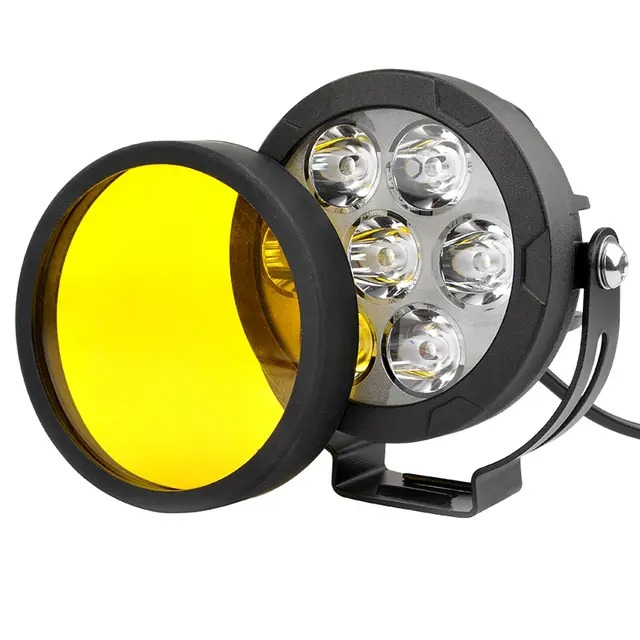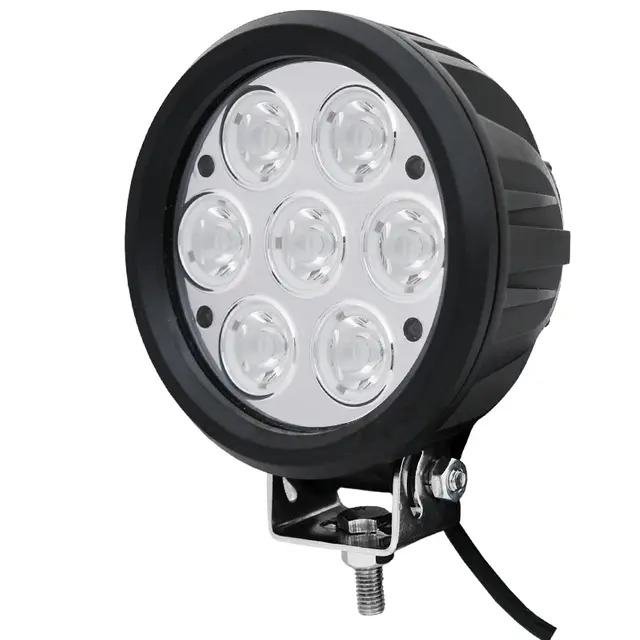
Choosing the right tractor work light is essential for ensuring optimal visibility, safety, and productivity during low-light agricultural operations. Whether plowing at dawn or loading hay bales late at night, a well-chosen flood work light can significantly improve your efficiency and reduce operational risks. But with dozens of technical options on the market, how do you make an informed decision? This guide breaks down everything you need to know.
Why Are Tractor Work Lights Crucial in Modern Farming?
Modern tractors are often used under diverse environmental and lighting conditions. Unlike urban vehicles, tractors are deployed in fields, pastures, and construction zones—where natural lighting is either inconsistent or absent during key work hours. This is where tractor work lights, especially flood-type lighting, come into play.
Flood lights for tractors are engineered to cast a wide-angle beam of illumination, ideal for short-range visibility. They provide broader area coverage, which is necessary for tasks like sowing, tilling, or equipment repair. Without appropriate lighting, not only is productivity compromised, but the likelihood of accidents increases sharply—especially in terrains with uneven surfaces or near mechanical hazards.
More importantly, farming today is not just about daylight operations. Night work is becoming increasingly common due to scheduling needs or temperature-related considerations (e.g., working in cooler night temperatures during summer). In such cases, the correct flood work light setup on your tractor is not just an add-on; it's a must-have feature that supports modern-day agricultural efficiency.
Key Factors to Consider When Choosing a Flood Work Light for Tractor
1. Lumens and Brightness Output
The most important technical specification in any floodlight is its lumen rating, which measures brightness. For tractors, you generally want a work light that offers between 1,500 to 6,000 lumens, depending on the application.
1,500–3,000 lumens: Suitable for close-range work like attaching implements.
3,000–4,500 lumens: Ideal for medium-range visibility for plowing or harvesting.
4,500–6,000 lumens: Best for wide-field operations or high-speed equipment movement.
It’s important not to confuse wattage with brightness. Higher watts may mean more power draw, but not necessarily more light. Always prioritize lumens for true performance.
2. Beam Angle and Light Distribution
Flood work lights differ from spotlights in their beam angle. Floodlights generally provide a beam angle of 60° to 120°, offering broad coverage but at a shorter distance. Consider your working environment:
If you’re navigating wide open fields, a beam angle above 90° is ideal.
For narrow spaces or loader operations, a tighter angle (around 60°) offers better focused light without overwhelming your line of sight.
Additionally, verify if the light offers uniform light spread. Uneven lighting leads to glare and dark spots, which can hinder visibility and increase fatigue.

Construction Quality and Weather Resistance
Farm equipment operates in rough, muddy, and wet environments. Therefore, the build quality of the flood work light must be exceptionally durable. Look for these specifications:
Material: Die-cast aluminum housing is common and offers both strength and heat dissipation.
Lens: Polycarbonate lenses are preferred over glass due to their impact resistance.
Waterproofing: Check for an IP rating. For agricultural use, IP67 or higher is strongly recommended, indicating protection from dust and temporary immersion in water.
Besides waterproofing, consider vibration resistance, as tractor work lights are exposed to continuous movement. A rugged mounting system with anti-vibration technology can prolong lifespan.
LED vs. Halogen vs. HID: What’s Best for Tractor Work Lights?
The type of lighting technology used in flood lights affects performance, energy efficiency, and longevity. Here’s a quick comparison:
| Feature | LED | Halogen | HID |
| Brightness | High lumen/watt ratio | Lower lumen output | Very bright |
| Energy Efficiency | Very efficient (low watt draw) | High energy consumption | Moderate |
| Lifespan | 30,000–50,000 hours | 500–1,000 hours | 2,000–5,000 hours |
| Heat Output | Low | High | Moderate |
| Cost | Moderate to high | Low | Moderate |
| Shock Resistance | High | Low | Moderate |
LED flood work lights are the clear winner for most tractor applications. They offer superior brightness, excellent efficiency, and long lifespan—all while being tough enough for rugged agricultural use.
Power Source and Installation Compatibility
Before purchasing, assess your tractor’s electrical system. Most modern flood lights for tractors operate on 12V or 24V DC, compatible with common tractor batteries. However, it's essential to match the voltage of the light with your vehicle's output to avoid electrical damage.
Also, evaluate:
Mounting Options: Look for adjustable brackets or magnetic mounts for ease of installation and repositioning.
Wiring Kits: Some lights come with complete kits, including switches, relays, and fuses.
Heat Dissipation: Integrated heat sinks help manage thermal output, enhancing both safety and longevity.
Proper installation not only ensures functionality but also prevents issues like short circuits or blown fuses during extended operation.
Cost vs. Quality: Finding the Right Balance
While it's tempting to choose the cheapest available option, quality often correlates directly with performance and reliability. A substandard flood light may fail within months, generate uneven lighting, or worse—drain your tractor’s battery unnecessarily.
Investing in a mid-range or high-quality LED flood light can save money in the long run by reducing replacements and improving efficiency. That said, always balance your budget with the intended use:
Also, read user manuals and installation guides, and consider models that offer EMC compliance to prevent radio or GPS interference.

FAQ: Frequently Asked Questions
Q1: Can I use any floodlight on my tractor?
Not all floodlights are suitable for tractor use. You need models specifically designed for outdoor, rugged environments, with appropriate voltage ratings (12V/24V), waterproofing, and vibration resistance.
Q2: What’s the difference between flood lights and spotlights?
Flood lights provide a wide-angle beam for area illumination. Spotlights emit a narrow, focused beam ideal for long-range visibility. Flood lights are better for general working areas; spotlights are better for navigation or distant object focus.
Q3: How long do LED tractor work lights last?
Most LED tractor lights last between 30,000 and 50,000 hours, depending on the brand, usage, and environment. Proper installation and maintenance further extend their operational lifespan.
Q4: Do flood work lights drain the battery quickly?
LED flood work lights consume very little power compared to halogen or HID. When correctly installed and used within recommended limits, they won’t significantly drain the battery.
Conclusion
Choosing the right flood work light for your tractor is more than a functional upgrade—it’s a commitment to safer, more productive operations. Whether you're a commercial farmer, a hobbyist, or a contractor, proper lighting ensures that your tasks are done with precision and minimal risk.
Focus on lumens, beam angles, construction quality, and compatibility with your equipment. Prioritize LED over outdated technologies for long-term value. And always balance cost with quality—because in the long run, reliable illumination pays dividends in safety, efficiency, and peace of mind.
























